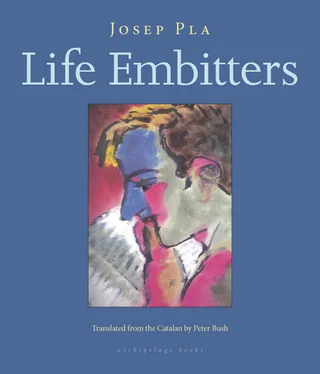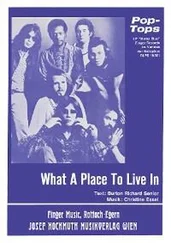Josep Pla - Life Embitters
Здесь есть возможность читать онлайн «Josep Pla - Life Embitters» весь текст электронной книги совершенно бесплатно (целиком полную версию без сокращений). В некоторых случаях можно слушать аудио, скачать через торрент в формате fb2 и присутствует краткое содержание. Год выпуска: 2015, Издательство: Archipelago, Жанр: Современная проза, на английском языке. Описание произведения, (предисловие) а так же отзывы посетителей доступны на портале библиотеки ЛибКат.
- Название:Life Embitters
- Автор:
- Издательство:Archipelago
- Жанр:
- Год:2015
- ISBN:нет данных
- Рейтинг книги:4 / 5. Голосов: 1
-
Избранное:Добавить в избранное
- Отзывы:
-
Ваша оценка:
- 80
- 1
- 2
- 3
- 4
- 5
Life Embitters: краткое содержание, описание и аннотация
Предлагаем к чтению аннотацию, описание, краткое содержание или предисловие (зависит от того, что написал сам автор книги «Life Embitters»). Если вы не нашли необходимую информацию о книге — напишите в комментариях, мы постараемся отыскать её.
Life Embitters — читать онлайн бесплатно полную книгу (весь текст) целиком
Ниже представлен текст книги, разбитый по страницам. Система сохранения места последней прочитанной страницы, позволяет с удобством читать онлайн бесплатно книгу «Life Embitters», без необходимости каждый раз заново искать на чём Вы остановились. Поставьте закладку, и сможете в любой момент перейти на страницу, на которой закончили чтение.
Интервал:
Закладка:
Sr Peret and his wife lived admirable lives. His good lady ruled the roost. He never raised any objections. He wasn’t the kind to object. It didn’t form part of his temperament. His wife’s aspirations always meshed with his. They were a perfect match.
The odd friend would often express to his face a judgment with which he couldn’t possibly agree. Then something would happen that was characteristic of Sr Peret. He would wave his hand, as if to suggest he was about to refute what he’d just heard. His face glowed from the positive efforts he was making to develop an argument. Sometimes, he even uttered a few disconnected words … However, the time to respond passed, and in the end he said nothing. Others resumed the conversation … Sr Peret sat and gaped for a moment and, when he realized he couldn’t voice his objection, he did three things in a row: first he shrugged his shoulders, then leaned back on his chair, and finally just sat there. No. Sr Peret wasn’t a man to raise objections.
On the other hand, he didn’t have any vices. He was unadventurous on every front. Perhaps, very occasionally, he smoked a cigarette … when offered one. It wasn’t that he was miserly, however. He didn’t smoke because he felt better than when he did, and he instinctively looked after his health in very precise ways. The unconscious plays a key role both in the preservation and the destruction of health. Man is born to conserve as well to destroy. That’s why those who think conservers don’t have fun are sorely mistaken.
Such virtues guaranteed Sr Peret the reputation he deserved. He never became president of anything, but was vice-president of several bodies; he was never elected secretary, but was a frequent vice-secretary. It was once rumored he would be made municipal attorney and he was made deputy municipal attorney. He recognized that these deputizing roles suited him down to the ground. This confluence of circumstances performed wonders: Sr Peret was perfectly fitted to life in Torrelles. The village was made to measure for him. It had twelve hundred inhabitants. It was no longer a rural hamlet. Rural hamlets have many drawbacks. Torrelles was a tiny town. It was essentially agricultural, though the presence of two knitwear factories had changed its internal make up. Torrelles had a cinema, a casino, an orchestra, and a post office. There was a degree of social life. People were always up for a game of chess or cards. Butchers slaughtered daily. Six houses had a bathroom and central heating, heating that objectivity duly compels us to note was rarely switched on. Sr Peret had running water, a wash basin and a rather old-fashioned tin tub. He didn’t have central heating. In this, as in everything else, Sr Peret was a middling man.
Sr Peret felt wonderfully at home in Torrelles. As we have said, he was a perfect match. Generally speaking there are property owners, and people from all social classes who only aspire to live in bigger places — and not necessarily Barcelona. Sr Peret wouldn’t have budged from Torrelles for anything in the world. For him, everything it had was excellent: its vegetables, meat, and fish (though it had little in the way of fish), its water, and its wine; he found its air best suited his lungs, and the character of the people blended with his temperament. He understood the people in his little town, understood them and never needed anything explained. He was no fanatical local patriot. He wasn’t like so many, many folk who think everything produced within their municipal boundaries is the best in the world, whether it’s tomatoes or broccoli, local writers or water from the fountain, grilled sardines or peas to accompany veal. No, Sr Peret never embraced extremes. He thought, quite simply, that Torrelles was lovely: “It’s small,” he would say, “but life here is good.”
In effect, he’d never left the countryside. The rare, sporadic trip to Barcelona, and that was that. His sedentary habits were ingrained and resistant. When he did travel, nowhere was as nice as Torrelles. He had a fairly limited sense of curiosity, but when he declared that nowhere was as nice as his little town, he was being sincere. He couldn’t remember ever being ill there, except when he was a child, but had no clear recollections of those illnesses. He’d never felt any pain, nothing ever hurt: be it his mouth, nose, eyes, belly, or feet. A small wart once appeared on his left cheek and melted away as quickly as it had come. One winter he caught a slight cold: nothing really. His was a good example of a perfect match with a particular part of the earth’s crust. Of course, he was sensitive to everything that happened around him, whether it was a sad or happy event, and at times he seemed to respond with alacrity. However, considering the splendid equilibrium of his mind and body, I did sometimes wonder whether a large part of that sensitivity wasn’t unconscious.
What I’ll now try to describe relates to this hunch I have just mentioned.
Sr Peret was everybody’s friend and one can say that there was nobody in Torrelles who didn’t know him, though he seemed to be really close to only one person: Sr Rafel. They were childhood friends who had followed different paths. Sr Rafel had devoted his life to business, had earned a small fortune, and then retired from things financial. Nonetheless, when he retired he made the mistake many rentiers make: he miscalculated his retirement date, circumstances reduced his income and he lived with the anxiety that being forced to eat into his capital inevitably caused. He lived — in a word — meagerly.
They met in the café. They played a game every afternoon. Sometimes Sr Rafel accompanied him to his vineyard. They spoke freely about whatever came to mind.
“Peret,” Sr Rafel said to him one day, “you are such a happy man.”
“Come, come …” Sr Peret protested loudly, almost laughing. “Why do you say I’m a happy man?”
“Isn’t it obvious?”
“You’ve yet to tell me …”
“You’re a man who is at one with this world, and that’s a good reason for me to rejoice! You have all you need, and no worries.”
“I’m easy-going. That’s for sure!”
“Patient and happy. I sometimes see you looking so happy I fear for you …”
“Fear what?”
“I fear for you, as I do for all those who are too comfortable …”
“Go on, explain yourself …”
“What is there to explain? You can’t explain these things. They’re just things I feel, you know? You’re the kind of man who will sneeze three times in a row one day and drop down dead …”
“Please, I wish you’d stop mouthing such nonsense …”
“It isn’t nonsense at all. It’s simply what usually happens to people who feel so relaxed, people, like you, who are so happy.”
“Tell me, Rafel: are you joking or being serious?”
“I simply speak as a friend. You are such an outstanding example of the type and what I just said closely relates to such types, and I had to say something.”
“I could never have imagined that such things could be worrying you. I see you have turned into a prophet …”
As Sr Peret said these last words, he shuddered and Sr Rafel decided it would be best to forget it and change the subject.
Things would have probably stayed that way and Sr Peret’s striking sense of well-being would have soon erased that conversation from his memory if the two men hadn’t begun to speak along similar lines a few months later. What was curious about the second conversation was the way Sr Rafel used the same terms as in the first. “You are one of those men,” said Sr Rafel, “who is so at one with the world, that the day will come when you will sneeze three times in a row and drop down dead.” When Sr Peret heard him say that, he felt upset, and, as he wasn’t used to knowing what it felt like to be upset, he felt it twice as hard. Now he was the one who changed the subject.
Читать дальшеИнтервал:
Закладка:
Похожие книги на «Life Embitters»
Представляем Вашему вниманию похожие книги на «Life Embitters» списком для выбора. Мы отобрали схожую по названию и смыслу литературу в надежде предоставить читателям больше вариантов отыскать новые, интересные, ещё непрочитанные произведения.
Обсуждение, отзывы о книге «Life Embitters» и просто собственные мнения читателей. Оставьте ваши комментарии, напишите, что Вы думаете о произведении, его смысле или главных героях. Укажите что конкретно понравилось, а что нет, и почему Вы так считаете.












